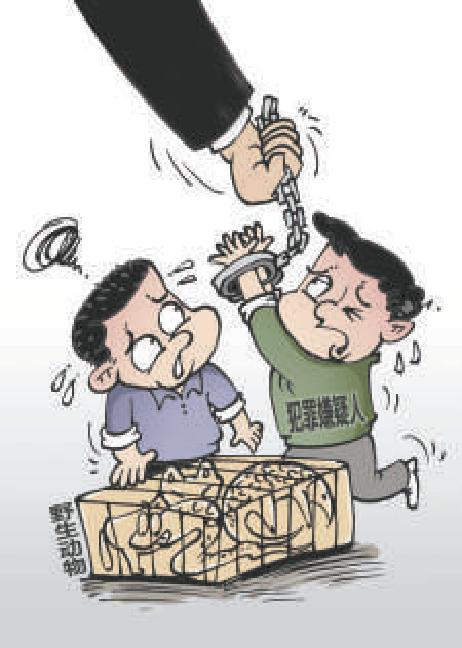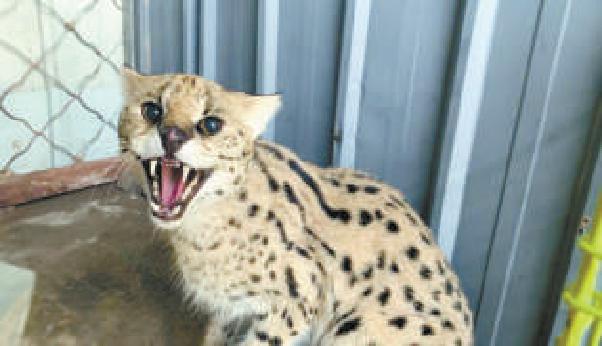
Pay money
Recently, a "little cheetah" was surprised in Shidu Mountain area of Beijing, and was rescued after many searches. According to expert identification, it is a unique wild animal (sǒu) cat in the African prairie. It is not distributed in the wild in China, but appears in the mountainous area of Beijing. It is likely that nearby residents abandoned it after illegally keeping pets or the animals escaped to the mountains themselves. Wild animals are protected by law. If they are kept as pets illegally, they may cause property losses to individuals and even jail time, and may also cause great damage to the natural ecological environment, which should not be underestimated. So, which animals can’t be kept as pets? What legal responsibilities do you need to bear for buying and selling at will?


Wild animals both at home and abroad are protected by law.
Article 6 of China’s revised Wildlife Protection Law in 2018 stipulates that any organization or individual has the obligation to protect wild animals and their habitats, and it is forbidden to illegally hunt and kill wild animals or destroy their habitats. According to the provisions of this article, wild animals, whether they are ordinary wild animals or rare and endangered wild animals, whether they are from abroad or local, are protected by law. Especially for rare and endangered wild animals, the state adopts classified and key protection measures. Wild animals under special state protection are divided into first-class protected wild animals and second-class protected wild animals. At the same time, China joined the Convention on International Trade in Endangered Species of Wild Fauna and Flora as early as 1980, and adopted the first-class protection and second-class protection measures equivalent to those stipulated by Chinese laws for the wild animals and plants listed in Appendices 1 and 2 of the Convention.
The serval cat from the African prairie has been listed in Appendix II of the Convention on International Trade in Endangered Species of Wild Fauna and Flora, and it also belongs to the second-class protected wild animals in China.
The exotic wild animals such as serval cats are not only protected by general laws, but also strictly controlled and protected by import and export. Article 37 of the Law on the Protection of Wild Animals stipulates that the introduction of wild animal species from abroad shall be approved by the competent department of wildlife protection in the State Council to introduce rare and endangered wild animals, and an import and export license shall be obtained according to law. Customs shall carry out entry quarantine according to law, and go through customs clearance procedures according to regulations with import approval documents or import and export permission certificates and quarantine certificates. China has joined the Convention on International Trade in Endangered Species of Wild Fauna and Flora, and will strictly investigate and punish the illegal import and export of wild animals according to the treaty. Strict control of wildlife import and export transactions is also an important protection measure for wildlife at home and abroad.
Illegal introduction of wild animals shall be fined at least 50,000 yuan.
If wild at heart, a wild animal, is kept as a pet, it is easy to cause personal and property losses to himself and others due to poor supervision. For example, the serval cat, a small cat carnivore, is very fierce. In the wild, it hunts rats, birds and insects. It can bounce up to 1 meter high and 4 meters away, and the smallest territory can reach more than ten square kilometers. It is difficult to control pets like domestic cats and dogs. In the event of an accident that infringes on others’ personal and property, it is difficult to capture wild animals and it is easy to hurt others twice.
Article 1245 of the Civil Code stipulates that if the animals raised cause damage to others, the animal keeper or manager shall bear the tort liability; However, if it can be proved that the damage was caused by the intentional or gross negligence of the infringed party, the liability may not be assumed or mitigated. Generally speaking, this provision can be directly applied to ordinary wild animals that are not dangerous, such as small wild birds, which infringe on the rights and interests of others. However, there are special provisions in Article 1247 of the Civil Code for illegally raising dangerous wild animals such as serval cats: if dangerous animals such as dogs that are forbidden to be kept cause damage to others, the animal keeper or manager shall bear tort liability. In other words, the Civil Code imposes a higher management obligation on the breeders of dangerous animals. Once the breeding of dangerous animals is prohibited from infringing, it is not necessary to judge whether the infringed person is subjectively at fault, the breeders should bear the tort liability. In addition, Article 1249 of the Civil Code also stipulates that if an abandoned or escaped animal causes damage to others during the abandonment or escape, the original owner or manager of the animal shall bear the tort liability. That is to say, once a wild animal is kept as a pet, once it escapes, the original keeper will always be liable for the infringement until the wild animal is found back or dies.
Raising wild animals may not only contribute to compensate others, but also pay a higher price for taking administrative and legal responsibilities. According to Article 53 of the Wildlife Protection Law, if wildlife species are illegally introduced from abroad, the wildlife protection department of the people’s government at or above the county level shall confiscate the imported wildlife and impose a fine of 50,000 yuan to 250,000 yuan. At the same time, Article 54 stipulates that those who illegally release wild animals imported from abroad into the wild environment shall be ordered by the wildlife protection department of the people’s government at or above the county level to catch them back within a time limit and be fined between 10,000 yuan and 50,000 yuan; If it fails to catch back within the time limit, the relevant wildlife protection department shall catch back or take measures to reduce the impact, and the expenses required shall be borne by the person ordered to catch back within a time limit. Illegal breeding of wild animals abroad will be subject to administrative fines. Once abandoned or the wild animal escapes to the wild, it is very difficult to recapture it, and illegal breeders will face very high recapture costs.
Buying, selling and transporting wild animals are subject to punishment.
There is no killing without buying and selling, and there is no hunting without trading — — This principle is not only reflected in the control of wildlife import and export, but also in the criminal legal protection. Article 341 of China’s Criminal Law stipulates that anyone who illegally hunts or kills rare and endangered wild animals under special state protection, or illegally buys, transports or sells rare and endangered wild animals and their products under special state protection, shall be sentenced to fixed-term imprisonment of not more than five years or criminal detention and shall also be fined; If the circumstances are serious, he shall be sentenced to fixed-term imprisonment of not less than five years but not more than ten years and shall also be fined; If the circumstances are especially serious, he shall be sentenced to fixed-term imprisonment of not less than 10 years and shall also be fined or confiscated. That is to say, buyers, transporters and sellers in the illegal trade of wild animals should bear criminal responsibility, and buyers and sellers should bear the same responsibility, so that buyers are afraid to buy and sellers are afraid to sell, which makes the hunters and killers in the upstream have no profit channels, which fully reflects the strict criminal legal protection of wild animals in China.
According to Article 1 of the Interpretation of the Supreme People’s Court on Several Issues Concerning the Specific Application of Laws in the Trial of Criminal Cases of Destroying Wildlife Resources, "acquisition" refers to the purchase behavior for profit and personal use; "Precious and endangered wild animals" refers to the first-and second-class protected wild animals listed in the national list of key protected wild animals, the wild animals listed in Appendices 1 and 2 of the Convention on International Trade in Endangered Species of Wild Fauna and Flora, and the above-mentioned species domesticated and propagated. Buying wild animals as pets naturally belongs to the situation of buying wild animals for "self-use".
In practice, many buyers buy overseas wild animals from the Internet out of curiosity or to satisfy their children’s wishes, such as precious and endangered parrots and lizards. Although they only watch them for themselves and do not make profits from secondary sales, they still belong to the "illegal acquisition" in the criminal law. Often, when the police file a case for investigation on the crime of illegally purchasing precious and endangered wild animals, the buyers are remorseful and call themselves ignorant of the law and make a big mistake.
Judge’s advice
Three measures to distinguish whether it is legal to sell pets online
For consumers, how to correctly distinguish whether the raised animals belong to the key protected wild animals must grasp the following:
The first is to look at the way of purchase. The way to buy pets must be standardized, and the daily supervision and management of the formal trading market is strict, so it is difficult for key protected wild animals to enter the market. For private transactions or online mail transactions, we must be extra careful.
The second is to look at the relevant documents and supporting materials. According to the relevant laws and regulations of the Wildlife Protection Law, individuals or institutions that raise key protected animals such as serval cats must hold the National License for Domestication and Breeding of Key Protected Wild Animals, which is generally used for scientific research before they can apply for a license. If you just want to watch and play, you can’t apply for a breeding license as a pet at home. It is an illegal act to raise serval cats without a license, and you will bear corresponding legal responsibilities. When consumers buy rare animals in the trading market, they must ask the seller for the corresponding legal source documents, import and export documents, animal inspection and quarantine materials, etc.
The third is to consult relevant professional departments or people with specialized knowledge. For some unusual animals, the author suggests not to raise them with curiosity. If you are not sure, you can consult the forestry department, the agricultural department and the wildlife protection center. If citizens are raising key protected wild animals, they should immediately contact and hand them over to the wildlife protection center for disposal according to law. Don’t let them loose in the wild for fear of being punished, which may cause greater damage to others’ personal, property or ecosystem.
Extended reading
Illegal introduction of wild animals from abroad is very harmful.
In the biological sense, due to the barrier of mountains, rivers and oceans, it is impossible for wild animals endemic to some continents to cross the Qian Shan and inhabit and breed on many continents around the world, and they can only live with other native species, forming an ecological closed-loop chain in one place. In this ecological chain, carnivores, herbivores, insects, plants, microorganisms and so on jointly maintain a long-term ecological balance. However, with the modernization of human activities, some species have traveled long distances with ships, planes and trains, surpassing the original natural species flow and being artificially introduced, breaking the balance of the original biological chain and causing ecological disasters. For example, after the introduction of rabbits in Australia, Burmese pythons in the United States and Asian carp, once the animals that lost their natural enemies adapted to the new environment, the population increased geometrically, causing serious damage to the local ecological chain.
China is one of the countries that are seriously endangered by the invasion of alien species. According to the Bulletin on the Ecological Environment of China in 2020 issued by the Ministry of Ecology and Environment, more than 660 alien invasive species have been found in China, including Procambarus clarkii, red imported fire ants, African giant snails, flying grasses, Chenopodium ambrosioides and other animals and plants, many of which were introduced as ornamental or pets, and spread to the natural environment due to improper management.
In this regard, China’s wildlife protection law also clearly stipulates that if wild animal species are introduced from abroad, safe and reliable preventive measures should be taken to prevent them from entering the wild environment and avoiding harm to the ecosystem. If it is really necessary to release it into the wild, it shall be implemented in accordance with relevant state regulations. Anyone who releases wild animals at will, causing personal or property damage to others or endangering the ecosystem, shall bear legal responsibility according to law. Therefore, keeping pets must not touch the bottom line of laws and regulations. From the point of view of protecting the ecological environment, we must consciously resist raising alien species and leave no opportunities for alien invasion.
(Author: Beijing No.4 Intermediate People’s Court)
Related links
These "souvenirs" may be punished if they are brought back to China.
Jiang Luoyi
Case playback
Liu returned home from work, chose no declaration channel when entering the country, and did not declare anything to the customs. Customs officers seized 1 pack of suspected pangolin scales, 12 suspected ivory products and 2 suspected leopard teeth in Liu’s checked baggage. After identification, the above items were 2,679 grams of pangolin scales, 1,083 grams of African elephant ivory products and African lion canine teeth. These precious animal products totaled more than 220,000 yuan. After arriving at the case, Liu voluntarily and truthfully confessed his criminal facts. He said that the animal products involved were used as supplements or as souvenirs for children. The court held that Liu violated the relevant provisions of the state prohibiting the entry and exit of precious animals and their products and evaded customs supervision. His behavior constituted a crime of smuggling precious animal products and should be punished according to law. In view of the fact that Liu surrendered himself, pleaded guilty voluntarily, pleaded guilty with a good attitude, and the precious animal products involved in the case have been detained on file and other statutory or discretionary circumstances, Liu can be given a lighter punishment according to law. The court finally ruled that Liu was guilty of smuggling precious animal products, sentenced to two years and six months in prison, suspended for three years, and fined 25 thousand yuan.
Judge’s prompt
With the deepening of international exchanges, more and more people go out to work, study abroad and travel, and smuggling cases of returned overseas people carrying precious animals or their products occur from time to time. In these cases, most of the defendants’ criminal motives were to bring precious animal products into the country and then resell them for profit, and a few were gifts to relatives and friends and personal collections. Judging from the cases accepted by the court, the targets of the crime of smuggling precious animal products include ivory, rhinoceros horn, pangolin scales, hawksbill, brown bear gall, spike and African lion canine teeth, etc., and most of the behaviors are carried with disguised luggage.
Maintaining the ecological balance together is of great significance to the maintenance and restoration of the ecological environment. The judge reminded people that they should consciously abide by relevant regulations and protect precious animals in their daily lives, so as to achieve harmony between man and nature.












